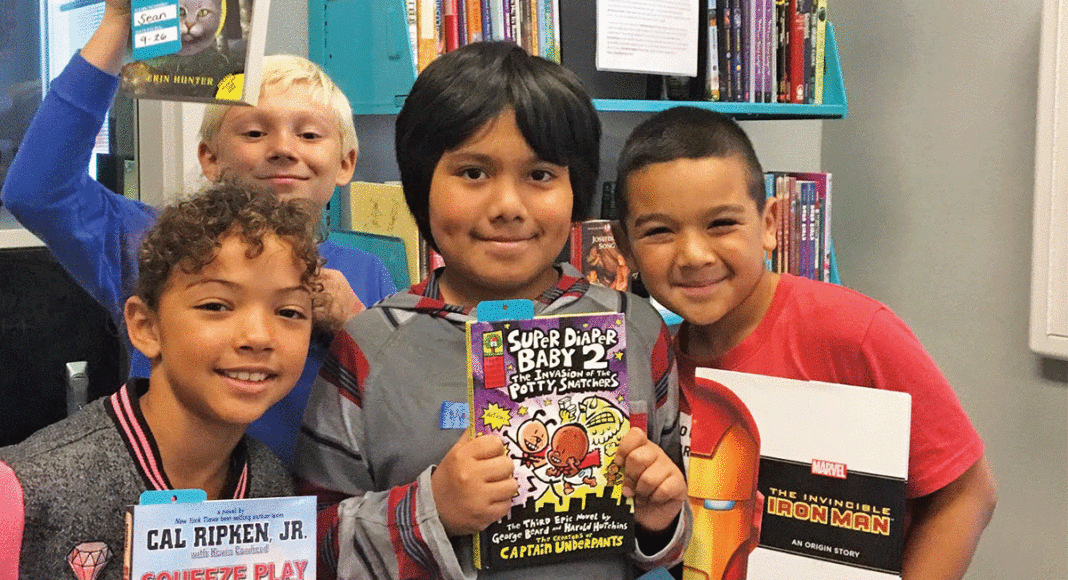Kate Pavao remembers her daughter, Coco, reading in the backseat.
The 12-year-old never stopped; she had read all of Harry Potter by age eight. Whether she was coming home from a short trip to the grocery store or a long vacation, Coco was often deep in the pages.
“She would keep reading. This kid—it was a stack of books all the time,” Pavao says. “It was from the time she was a baby: listening to books on CD, sitting in a stroller, anything she could get her hands on.”
Collette “Coco” Lazenby died in a car crash in 2015. She was a passionate volunteer and environmentalist who did good for the world—working at the Homeless Garden Project, writing to the president about the environment, picking cigarettes up off the beach, collecting jeans for homeless teens, and raising money for causes all around Santa Cruz.
“She was the kid rescuing worms in the rain,” Pavao says. “During beach cleanups, I asked her, ‘Don’t you feel good about yourself?’ She said, ‘No. I feel bad for what people have done to this beach.’
“For Coco, it was about: ‘We need to fix this.’ There’s so much beauty in the world, and we need to take care of it and each other.”
In the fall of the following school year, all 750 students at Watsonville’s Starlight Elementary School received their own memento honoring Coco’s spirit and passion for learning: a book on their birthday.
A few days after the crash, Starlight Principal Jackie Medina went to her friend Pavao’s house and brought up the idea they’d talked about a year before: Give a book to every student as a gift. The school set aside a library shelf with popular books guided by the librarian, with options in English and Spanish, so that any student can pick one when their birthday comes.
The principal had read that summer reading often boosts test scores. Pavao knew how much books meant to Coco.
The next year, Pavao and her husband, Aaron Lazenby, raised enough funds for 2,000 books across four schools. This year, it will be 5,000 in 10 public schools across Santa Cruz County. The Live Like Coco Foundation also gives scholarships and supports other nonprofits.
“Every kid in this community should have the opportunity to read and enjoy all the things our county has to offer, find out who they are and explore their interests, from Watsonville to Santa Cruz,” Pavao says.
A 2016 Grand Jury report praised the nonprofit’s efforts, saying that, for many children, the book they received through the organization was the first they ever owned.
Live Like Coco is one of six education nonprofits partnering with Good Times’ Santa Cruz Gives program for its annual holiday fundraising effort. Other groups include nature education outfit Watsonville Wetlands Watch, which educates kids about Pajaro Valley ecosystems; and literacy proponent Friends of the Santa Cruz Library, which fundraises for local libraries. There are more, too: Peer-mentoring group Girls Inc. of the Central Coast builds confidence in young women; arts advocacy group Tandy Beal & Company immerses children in creative projects; and FoodWhat?! empowers youth by teaching them about food justice.
Fertile Ground
When Margarito Rodriguez discovered wetlands, he was in the third grade.
Every Friday, he visited the Watsonville Wetlands Watch Center on the Pajaro High School campus, where he and his peers took field trips to the marshy soil of the Pajaro Valley.
Years later, he has become one of the program’s 12 wetland stewards, the same types of leaders that had inspired him years earlier.
Rodriguez now studies journalism and political science at Cabrillo College, and he says the nonprofit continues to inspire the country’s next environmental leaders, many of whom ask him questions they never thought they had.
Founded in 1991, the Watsonville Wetlands Watch’s mission is to protect, restore and foster appreciation of the Pajaro Valley’s wetlands. In addition to outreach and education, the group partners with the city of Watsonville for urban greening, trail creation and trail maintenance. It also plans for the future of the wetlands and publicly comments on projects that could affect habitats.
Executive Director Jonathan Pilch says the organization will also plant trees along streets and parks as part of state cap-and-trade funding, and is launching Wetland Wonders, a program to bring even more students like Rodriguez to the sloughs.
The program seeks to give an environmental education to every young person in the Pajaro Valley. With current funding, they reach less than 20 percent, Pilch says.
Confidence Boosters
Being a first-generation American isn’t easy. It’s harder when parental expectations collide with the wild experiences of high school.
Virginia Howard remembers having privilege growing up: Her parents gave her the guidance to go to a four-year university and could help with the resources to get her there. It wasn’t until she started working with families of incarcerated individuals in Watsonville through her church that she came into contact with girls who didn’t have those same opportunities.
“Many of them were shy and didn’t have parents who could help them go. I was like, God, what can we do for these girls?” Howard says.
A Monterey nonprofit, business and real estate lawyer, Howard soon learned from a friend about a program called Girls Inc. of the Central Coast.
The nonprofit provides Monterey County girls with peer mentors who offer support with life, college, career paths and building confidence through leadership. The one-year program takes high school girls from August through May and connects them with adult and peer mentors who teach them how to set goals, apply to college, and be healthy, along with other life skills.
Howard decided it should come to Santa Cruz County, too.
By the end of the year, it will serve 180 girls in Watsonville. Howard’s goal is for it be at Santa Cruz High School in 2019.
Girls often bond, moving past the alienations of teenage life. Most importantly, Howard says, the program can help them be self-sufficient. Graduated women have credited the program as a “place to escape” family troubles, cope with stress, avoid pregnancy and gangs, and lead their lives.
Booking It
Christine Candelaria’s kids grew up with the library. The library has also grown up with them.
The Santa Cruz mom of four has been going there for books and exhibits since they were born, and she’s Friends of the Santa Cruz Public Libraries’ newest board member.
“We need to keep engaging kids as they grow older,” she says. Her kids have built robots and battled them in the library and they’re currently taking coding classes there. “When I grew up, it was a quiet space, which I appreciate and still like,” she says. “But I’m glad it’s also evolved to provide whatever else the community wants and needs.”
Candelaria says reading still happens in the library, as it always has, but these newer programs bring the community in.
Friends of the Santa Cruz Public Libraries helps local branches with fundraising and lets residents know about all of the things their library can do. The program raised $20,000 for collections this year—as well as funding math and science programs, sponsoring the Veterans Resource Center, offering summer reading programs and paying for library facilities, like a new outdoor book drop at the Aptos branch.
Candelaria says she just learned about their adult crafting nights and poetry circles, adding, “I’m still on a mission to find everything the library offers.”
To donate to any of the 33 nonprofits participating in Santa Cruz Gives, visit santacruzgives.org through Sunday, Dec. 31.











